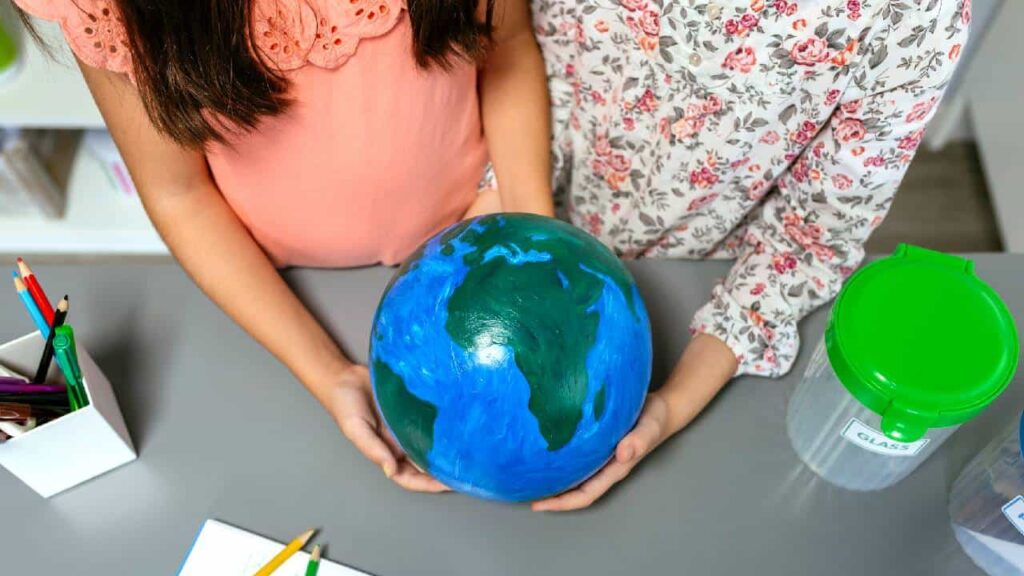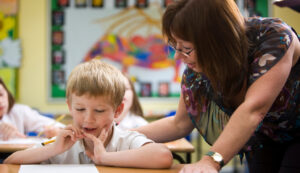Climate change education events at COP28
After the recent United Nations COP28 (the Conference of the Parties) event in Dubai at the end of 2023 there is once again a huge focus on how we can reverse the impacts of climate change and, within that, how we support future generations to meet that challenge.
However, as noted by commentators there is a lack of understanding amongst the younger generation of what climate change is.
Professor Geraint Jones (Executive Director & Associate-Pro-Vice-Chancellor of the National Institute of Teaching and Education at Coventry University) commented that many secondary schools he visited last year are unclear how to make climate change education engaging and interesting for young people to engage with and understand. This makes it clear that the school curriculum needs to be more connected on how to inspire children to address climate change.
How can environmental education help to combat climate change?
Walking into a school these days you’re as likely to see solar panels on the roof as alphabet posters on the walls. Also, pupils can be just as interested in talking about Greta Thunberg as they are about TikTok. Climate change and going green are firmly on schools’ agendas now. So how else can UK classrooms support sustainability and climate crisis learning?
Our kids are clued up and care deeply about the warming world they’ve inherited. Over the past year, we’ve seen them marching for the planet week after week. But while eagerness to learn and raise awareness about global warming today comes naturally to them, positive green behaviours aren’t always ingrained in the education system. Teaching sustainability isn’t quite as simple as ABC.
We need to foster climate awareness in pupils if we want them to grow up as responsible guardians for the planet. Green school policies implemented today lead to environmentally conscious choices made years later. The classroom is one place where we can sow those seeds for sustainability.

Support the delivery of environmental education in schools
A report by the University of Bristol found that most teachers in England, whatever their subject area, are already talking about climate change to their students and want to see a cross-curricular approach to the matter.
Schools have a huge role to play in preparing students for a sustainable future to pass on to their children, which is why environmental education research is so important.
Here is how schools can address climate change education:
1. Climate Literacy
In many ways, sustainability has become central to various subjects in the national curriculum in England and Wales. Pupils no longer only learn about pollution in geography and conservation in biology. There’s a bigger picture taking shape.
Nowadays maths lessons touch on carbon footprints and CO2 emissions. English classes explore ecological themes in literature. Design & technology focuses on upcycling materials. Even history looks at how climate change has impacted on societies centuries ago.
Slowly but surely, subjects across the academic spectrum are going greener. Unfortunately, despite this collaboration between the subject areas, children do not always seem passionate and driven about climate change education. Particularly in secondary schools, pupils have voiced their feelings to the school’s network and educators that environmental education is taught in a dull and uninspiring way.
So how do you make lessons on climate change and environmental issues engaging for young people?
The best way to encourage people to engage is through creativity and relevance. Teachers can use real-life examples of how climate change impacts other countries around the world and affects students at a local level. One example would be to use NASA’s satellite videos of how the increase in carbon dioxide (CO2) levels has risen in the last few decades. It demonstrates the need for reducing emissions and how the international response has been from world leaders.
Climate literacy must feel personal and actionable, empowering children to drive change beyond classrooms. Equipping them with knowledge, tools, and inspiration is crucial, given their future’s dependence on an unstable planet. We must engage them as active agents, not mere spectators. It’s a challenge, but one that resonates with young minds.
2. Specialised Sustainability Teaching Materials
It doesn’t stop at the curriculum either. Plenty of UK schools are taking advantage of environmental teaching resources created specifically to promote sustainability. These equip teachers and inspire pupils to take climate action.
WWF’s Green Ambassadors scheme, the Young Reporters for the Environment program, and SDG Student Action Awards are just some examples. Not to mention all the apps, videos and interactive online tools available. There’s a wealth of material to bring climate change awareness to life.
For those younger children, Our Classroom Climate is a teacher-led climate change education programme for Primary-age pupils, fully supporting the national curriculum across the UK and Ireland and is the perfect companion programme to the DfE’s sustainability & climate change strategy.
3. Outdoor Learning Opportunities
A potential magic-bullet for UK schools. Teaching colleagues and OFSTED constantly refer to the resilience, wellbeing and creativity offered by outdoor education.
Anecdotal evidence is pointing to a huge improvement in school attendance and wider learning attitudes amongst pupils when working together and individually outside.There are also measurable reports detailing the massive increase in the use of language and reduction in behaviour incidents too.
As well-being and mental health rightly sit at the heart of all happiness and learning, this area cannot be over-emphasised.
Getting out of those classroom doors and into the local communities and into the natural world can also work wonders at boosting engagement with environmental themes. Outdoor learning is a core part of the Forest School movement. Kids are encouraged to spend regular curriculum time learning in local green spaces. Teachers can speak to their school network and wider education sector on where to take children on school trips to engage their pupils on the importance of taking action against this climate crisis we are facing.
Other activities often focus on areas like species monitoring, gardening, conservation and green energy. It’s a refreshing change being surrounded by nature, not desks. And offers tons of scope for hands-on climate crisis learning.

Developing a culture of caring for the environment
With that being said, it doesn’t mean schools are on their own when it comes to climate education. Far from it. Youth movements and charities are stepping up too. We need academia and activism joining forces on this stuff.
The Teach the Future campaign is one great example. This nationwide initiative aims to get climate change onto all school schemes of work by 2025. Students, scientists and sustainability groups have united behind an action plan for policymakers.
Expect more coalitions like this that amplify young voices and apply evidence-based pressure. When combined with on-the-ground efforts in educational settings, they could carry clout. Especially as sustainability teaching requirements increase over time.
Empowering Climate-Conscious Pupils
There is no shortage of routes for schools to champion climate education nowadays. Be it embedding sustainability across subjects, taking lessons outdoors or ramping up eco operations. Children have access to learning opportunities like never before.
Most importantly though, it’s about fuelling their passions. Giving them agency to drive change rather than just preaching doom. Greta and her peers have reminded us that young people will be the ones living with the consequences of climate inaction.
While foundational skills like maths and literacy are still crucial, we need to view climate change education with the same level of importance if we truly want to equip future generations for the challenges ahead and drive momentum towards a sustainable, equitable future.
Instilling climate literacy and environmental values from a young age nurtures the passion, social conscience and orientation towards justice that can reform society’s relationship with the planet for the better. Though literature, assessments and school trips may look minor on the surface, the idea behind them must respond to the urgency of prepping youth to inherit and reshape a world profoundly threatened by climate instability. We owe that much to the generations to come.


